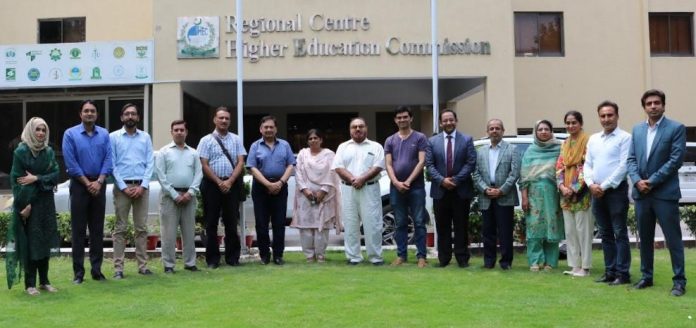ISLAMABAD, FEB 10 /DNA/ – The Higher Education Commission (HEC) of Pakistan has issued revised curricula for BS and MS degree programmes in Microbiology, incorporating modern advancements to align with evolving academic and industry needs.
The initiative was a joint effort of HEC and the Pakistan Academy of Sciences, and the curricula were developed by the National Curriculum Review Committee (NCRC), comprising senior academics from leading universities across Pakistan including Balochistan University of Information Technology, Engineering and Management Sciences, Quetta; COMSATS University Islamabad; Government College University, Faisalabad; Government College University, Lahore; Kohat University of Science and Technology, Kohat; Quaid-i-Azam University, Islamabad; University of Karachi, Karachi; University of Management and Technology, Lahore; and the University of the Punjab, Lahore.
The NCRC was chaired by Prof. Dr. Anjum Nasim Sabri of the University of the Punjab, Lahore, and co-chaired by Prof. Dr. Naeem Ali of Quaid-i-Azam University, Islamabad, with Mr. Muhammad Ali Baig, Deputy Director at HEC, serving as its secretary.
The revised BS Microbiology curriculum now requires a minimum of 134 credit hours, introducing new and contemporary courses such as Microbial Diversity & Systematics, Microbial Genetics, Soil & Agriculture Microbiology, Scientific Writing & Research Methods, Clinical & Diagnostic Microbiology, Microbial Biotechnology, Antimicrobial Agents & Resistance, and Recombinant DNA Technology.
To keep pace with emerging scientific and technological advancements, Sustainable Development and Artificial Intelligence in Microbiology have also been included. The model scheme of study for BS Microbiology further allows for four elective courses, which universities may offer based on scholarly progress and industry demands.
Emphasizing experiential learning, the revised curriculum mandates a supervised internship and a capstone project, each carrying three credit hours. While the committee did not recommend a standalone Associate Degree in Microbiology, students may exit the BS programme with an Associate Degree under special circumstances, as per HEC regulations. For MS Microbiology, the revised framework includes six elective courses and a mandatory research requirement, with universities given the flexibility to offer electives based on faculty expertise and institutional resources.
The revised curricula for BS and MS degrees in Microbiology set broad academic standards, including eligibility criteria, programme learning outcomes, model scheme of studies, course learning outcomes, and degree award requirements, allowing universities to develop detailed syllabi and course content tailored to industry and research needs.
HEC has advised all universities to align their BS and MS Microbiology degree programmes with these revised standards at the earliest. The updated curricula are available on HEC’s official website.

















